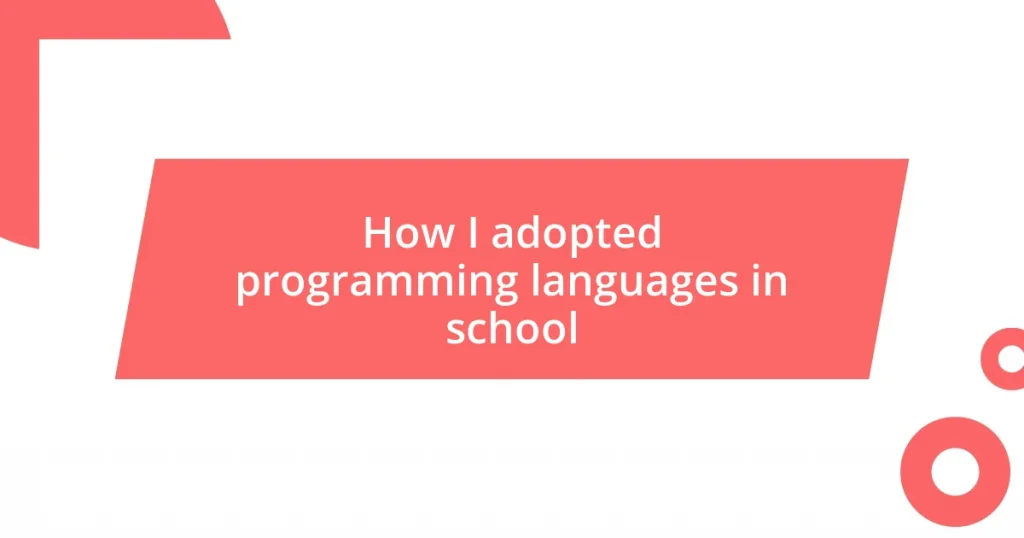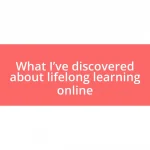Key takeaways:
- First encounter with programming introduced a sense of excitement and creativity, leading to a deeper exploration of languages like HTML and JavaScript.
- Joining communities and utilizing learning resources such as Codecademy and forums enhanced skills and provided crucial support throughout the programming journey.
- Balancing coding with studies through effective time management and project-based learning transformed challenges into enjoyable and rewarding experiences.
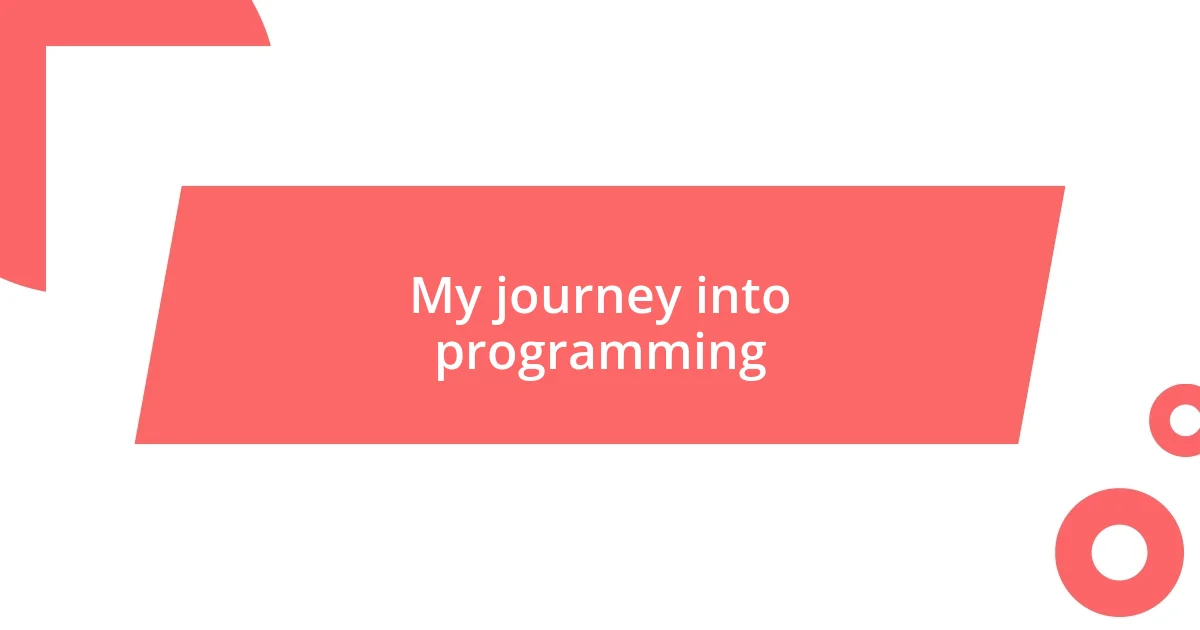
My journey into programming
I still remember the day I first encountered programming in school. It was during a tech class, and we were introduced to HTML. As I typed out those simple tags, I felt a rush of excitement; it was like creating something from scratch, almost magical. Can you recall the first time you turned an idea into reality?
As I delved deeper, my interest grew beyond just HTML. I stumbled upon JavaScript and was instantly captivated by its power to bring web pages to life. I vividly recall one late night, battling frustration and sleepiness, but each small victory in debugging was like a mini-celebration. It’s moments like these that made me realize how resilient I could be.
Over time, I developed a sense of belonging in the programming community. I joined coding clubs and participated in hackathons, where collaboration and shared passion transformed my learning experience. Have you ever felt that electric connection with others who share your interests? For me, it was empowering and motivating—fueling my desire to learn and innovate in ways I never thought possible.
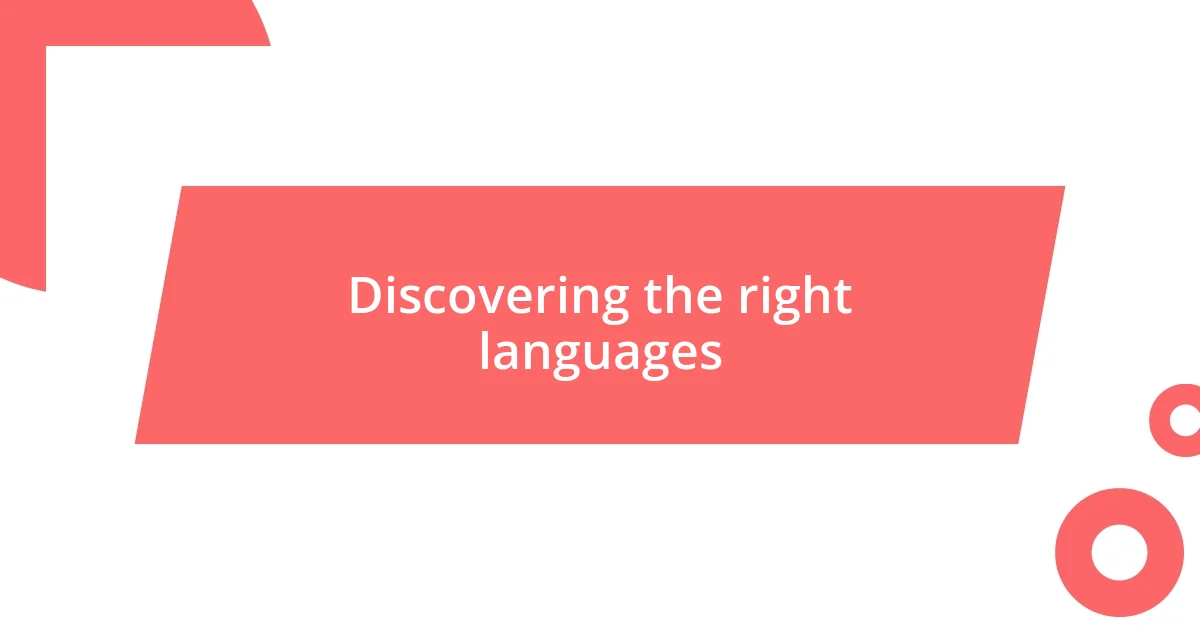
Discovering the right languages
Discovering the right programming languages felt a bit like navigating a treasure map. I initially explored languages recommended by my teachers, but it wasn’t until I experimented on my own that I found what truly resonated with me. For example, while Python’s readability drew me in, learning C++ reminded me of the satisfaction in overcoming complex challenges—like solving a tricky puzzle. Have you ever discovered a language that just clicked for you?
As I continued my journey, I realized that each language had its unique strengths. When I compared my experiences with friends who were focused on Java, I noted how their emphasis on structure helped them build robust applications. It made me reflect on the balance between creativity and logic in programming, which is essential for any aspiring developer. Can you remember a time when you learned something valuable from someone else’s perspective?
Ultimately, discovering the right languages is about finding joy in the learning process and aligning with your interests. I often sought out projects that sparked my creativity, such as building a website for a local charity using JavaScript and HTML. These moments reinforced my belief that the right languages not only enhance my skills but also make the journey enjoyable and fulfilling.
| Language | Key Strength |
|---|---|
| HTML | Basic structure of web pages |
| JavaScript | Interactive web experiences |
| Python | Readability and simplicity |
| C++ | Performance and resource management |
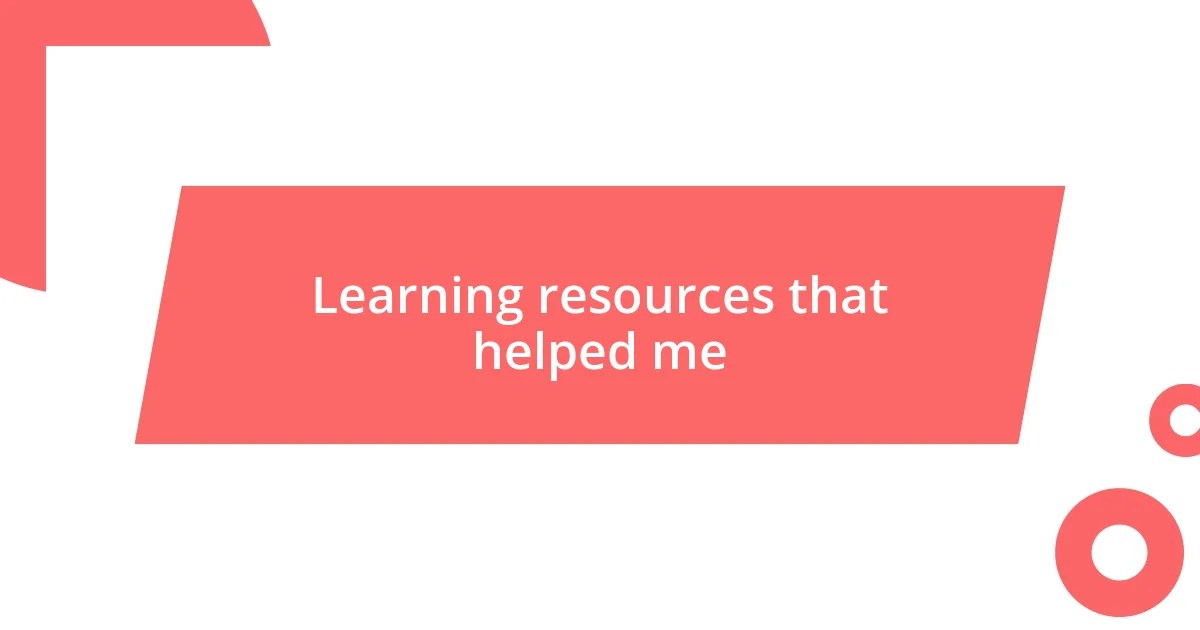
Learning resources that helped me
Learning resources played a pivotal role in my programming journey, guiding me through the complexities of each language. I vividly remember spending countless hours on platforms like Codecademy and Khan Academy, where interactive exercises helped solidify my understanding. The gratification of mastering a concept and then immediately applying it in projects was a feeling I cherished. I can still feel the thrill of completing my first online course; it felt like unlocking a new level in a game.
Here are some key resources that truly enriched my learning:
- Codecademy: Provided hands-on interactive learning for various languages.
- Khan Academy: Offered engaging tutorials, especially in JavaScript, which sparked my creative coding.
- FreeCodeCamp: Helped me transition from theory to real project work, like building my first portfolio site.
- YouTube: Channels like Traversy Media filled the gap with tutorials that felt personal and relatable.
- Books: “Eloquent JavaScript” was my go-to for deep insights into JS intricacies; I still refer back to it.
I also found immense value in collaborative resources, particularly online forums and coding communities. The conversations in forums like Stack Overflow often revealed solutions to problems I’d spent hours grappling with. Each response felt like a lifeline, helping me bridge the gap between confusion and clarity. I distinctly remember posting a question about a frustrating bug in my code. The replies came pouring in, and one suggestion led me to solve it after days of trial and error. That sense of community made my learning not just easier, but more enjoyable.
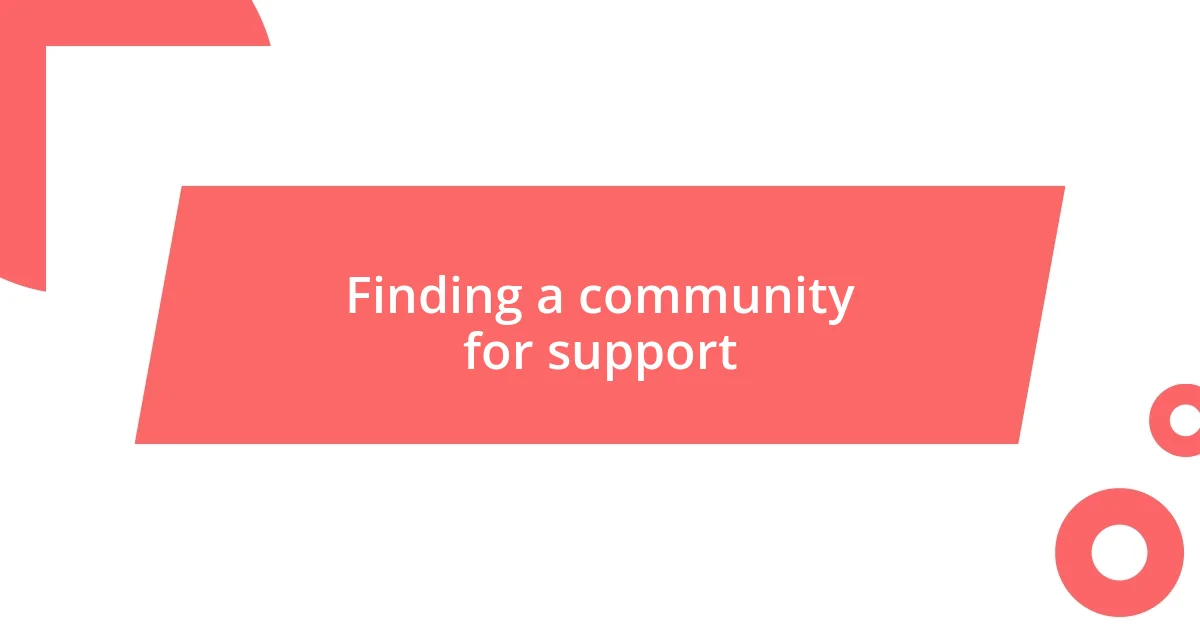
Finding a community for support
Finding a community for support was a game-changer in my programming journey. I remember the first time I joined a local coding meetup; I walked in feeling nervous, but within minutes, I was surrounded by people who shared my passion. Sharing my struggles with others made me realize that we all face similar challenges, and their encouragement was exactly what I needed. Have you ever felt that rush of relief when someone else understood your coding woes?
Online forums and social media platforms also became my go-to spaces for connection. The camaraderie in those virtual communities gave me the chance to ask questions and share my learning experiences without fear of judgment. I recall a moment when I posted about my struggles with a complex algorithm; the responses flooded in, filled with insightful tips and encouragement. That support not only clarified my doubts but also fostered a sense of belonging that motivated me to keep going.
Ultimately, finding a supportive community made me realize that I wasn’t alone in this journey. I often exchanged ideas and collaborated on projects, igniting my creativity and expanding my skill sets. There’s something powerful about bouncing ideas off each other, isn’t there? Those interactions not only enhanced my technical abilities but also transformed my learning into a social experience, turning solitary coding sessions into collaborative adventures.
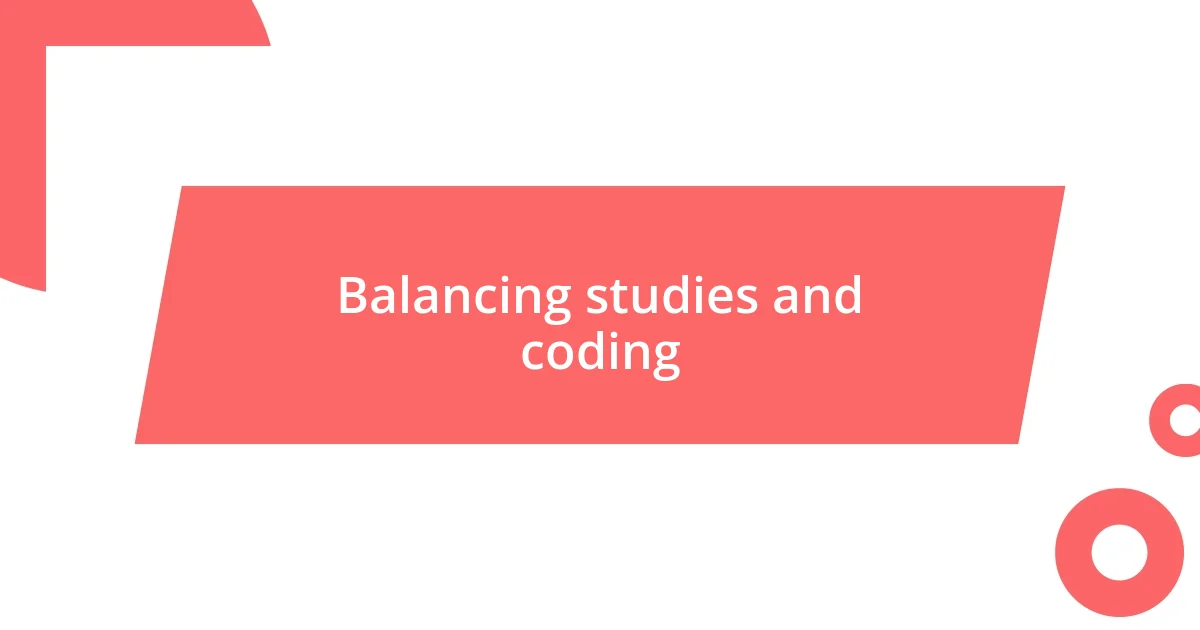
Balancing studies and coding
Balancing coding with schoolwork felt like a juggling act at times. I remember cramming for exams while also trying to debug my code late into the night. There were moments when anxiety crept in, and I questioned if I could manage both. However, I realized that time management is essential. I started setting specific hours for studying and coding, which helped me allocate my focus more effectively. Have you ever found that setting boundaries can lead to surprising clarity in your tasks?
One strategy that worked well for me was using the Pomodoro Technique—25 minutes of focused work followed by a short break. Incorporating coding into this method was a game changer. During those breaks, I often found myself reflecting on how the concepts I was learning in school tied into my coding projects, making both studies feel relevant and interconnected. I can still recall those late nights when a sudden breakthrough in coding felt as satisfying as grasping a tough concept in class.
I also carved out weekends just for coding, treating them like a mini boot camp. Packing in extended coding sessions helped me immerse myself in projects without the distractions of schoolwork. I remember one weekend I dedicated entirely to building a personal app. Losing track of time while coding was exhilarating! This approach not only enhanced my skills but also reminded me why I loved programming in the first place: the sheer joy of creating something from scratch. How do you think connecting your passions can transform your learning experience? I firmly believe it can make all the difference!
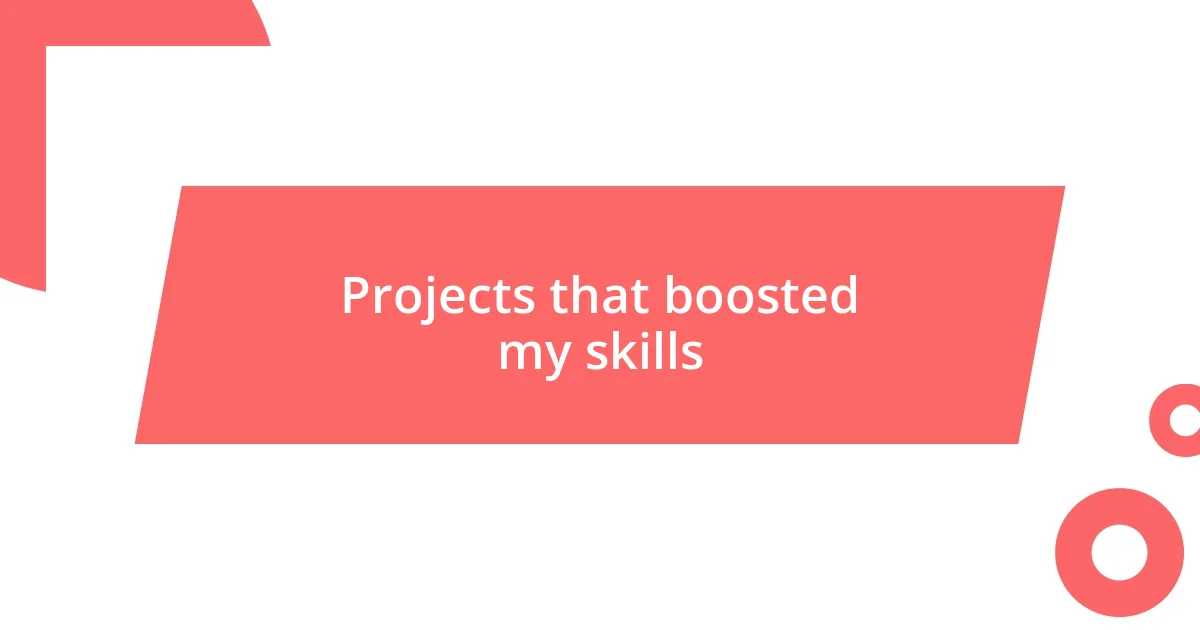
Projects that boosted my skills
One project that significantly boosted my skills was a collaborative game development assignment. As I teamed up with classmates, I found myself in charge of creating the game mechanics. It was exhilarating to see my ideas transform into actual code, yet there were hurdles, like debugging a particularly tricky physics engine. I learned not just to fix errors, but to anticipate potential pitfalls early on. Have you ever felt that mix of excitement and frustration while debugging? It became a profound learning curve that challenged my problem-solving abilities every step of the way.
Another defining experience was developing a web application for a local charity. I still remember the thrill of building a platform that had a tangible impact. My role involved making the site user-friendly, which pushed me to hone my front-end skills and learn new libraries. While collaborating with users to gather feedback, I felt a deep sense of purpose. How often do we get to blend technical skills with meaningful causes? This project solidified my understanding of user experience, transforming my coding from mere tasks into a way to make a difference in the world.
Additionally, I embarked on a personal project to automate my daily routines with scripts. The victory of integrating various programming languages to create a unified solution felt rewarding. I remember the moment when I witnessed my computer perform a series of tasks with just a click. That sense of empowerment ignited my passion even further and made me realize how practical skills could simplify my life. Can you recall a time when your coding efforts significantly improved your daily routine? I cherish those moments as they remind me of the real-world applicability of programming, intertwining my academic journey with everyday life.
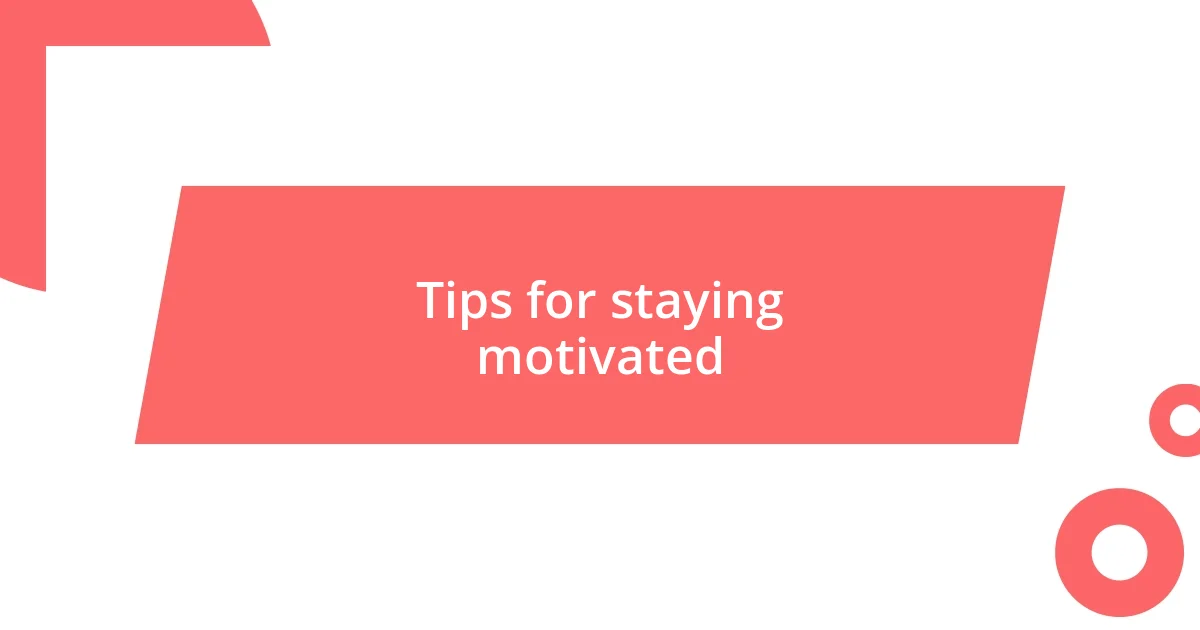
Tips for staying motivated
Staying motivated in programming, especially while navigating school, can often feel daunting. One trick I found invaluable was celebrating small wins. Whether it was successfully solving a challenging problem or finishing a coding assignment, I made it a point to recognize those achievements. I remember treating myself to a favorite snack after completing a project; it felt like a reward that kept me eager to tackle the next challenge. What small victories have you celebrated in your own journey?
Another effective method was surrounding myself with like-minded peers. Forming a study group turned out to be incredibly motivating. We met regularly to share ideas, troubleshoot each other’s code, and spark new project ideas. I distinctly recall a session where we brainstormed a fun collaborative project, and the energy was contagious! Being in that supportive environment made coding feel less isolating. Have you ever experienced that power of collaboration in your learning?
Finally, I believed in the importance of setting achievable goals. I started breaking projects into smaller tasks, each with a clear deadline. This approach transformed overwhelming assignments into manageable steps. I vividly remember staring at a complex project and, rather than feeling defeated, focusing on just one feature at a time. Each completion brought a wave of satisfaction and renewed focus. How do you approach large projects to keep your motivation alive? Finding a strategy that works for you can be key to sustaining your enthusiasm for programming.










